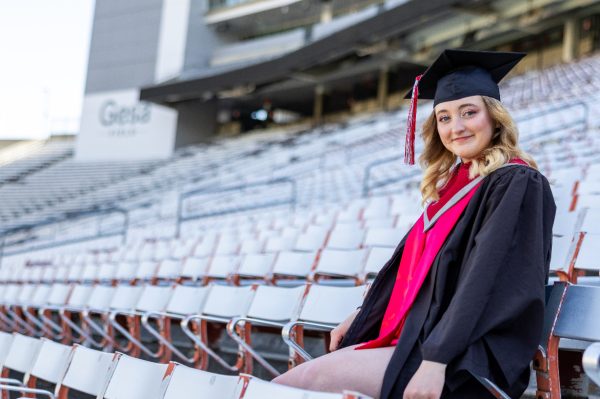Attraction: Societal norms temper ancient motives
March 3, 2017
All animals have instincts for survival purposes. But considering the complexity of humans’ social status, the societies we’ve created over thousands of years have shaped the way we react to and view them.
Richard Taflinger, a WSU clinical assistant professor of communication who has studied the biological basis of sex appeal, compares humans to the butcherbird when it comes to instincts. The butcherbird male who catches the most insects for the female is the one she is likely to mate with because he is a good provider and can take care of her.
“Women’s instinct is, ‘the hell with the sex, what does he bring to me?’ ” he said. “ ‘I need [resources] to sustain me during my pregnancy, my birth and raising my offspring until they are old enough to go out on their own.’ ”
The physical aspect is still a contributing factor, but it will not make or break her final decision, Taflinger said.
The environment in which a woman grows up can drastically influence her view of an ideal partner or her “type,” and her standards go far beyond a man’s instinctive, simple criteria when choosing a mate, Taflinger said.
“Instinctively, males throughout the animal kingdom are going, ‘can I get her pregnant?’ ” Taflinger said. “That’s a socially unacceptable relationship, but that’s the way the instinct operates.”
As most people discovered through either personal experience or witnessing it, this clash between humans’ social and instinctual sides makes it more difficult than it is for other animals to find a compatible companion. Society’s biases and stereotypes, and more recently social media, all contribute to those difficulties.
“The purpose of rules in society is to cut down on the friction between the members of that society so we don’t go around killing each other,” Taflinger said. “You watch bulls like elephants, seals or deer, the males battle each other. We have lots and lots of rules to cut down on things such as men from beating the crap out of each other to impress women.”
Female animals and humans are promiscuous, yet still selective, Taflinger said. When the pill came out in the 1960s, women gained more control over their sexuality as well as the ability to be just as promiscuous as the man, minus the life-changing consequences.
According to a Psychology Today article by social psychologist Jeremy Nicholson, research has shown that individuals make trade-offs when choosing a partner. For example, people will choose a partner who is either ambitious with financial prospects, or someone who is loving, caring and attracted to them.
“While we each desire a unique combination of features in a partner, we all choose from among the same basic categories and trade-offs,” Nicholson wrote. “We work with those categories and compromises as we make choices about who we will also become as partners.”
He further explained how men and women displayed a varying distinction in how they resolve these types of trade-offs.
Men tend to choose an appealing, healthy and loving partner who wants a family, while women more often select a mate who is dependable, educated and has status or resources, Nicholson wrote.
Men have learned to adapt to society’s acceptable rules that women primarily guide and this is the main reason for dates, flowers, gifts, etc., Taflinger said. A woman wants to see if the man fits what she would need in the long term, and she learns this through conversation.
If a man wants a woman, he must have much more to offer than merely his looks.
“It can come down to how they’re dressed or what car they drive, which is why so many middle-aged men buy sports cars,” Taflinger said. “It seems to indicate, one, ‘I’ve got money,’ and two, ‘I’m still young, ignore the fact that I’m bald now.’ ”
A woman’s choice of mate is often dictated by society’s norms, as well as what is personally important to her, Taflinger said.
“For some, [attraction] might be a person who is handsome or beautiful in a particular way,” Nicholson wrote, “for others it might be a special positive personality characteristic. We all pick something unique, but after selecting from some standard types of partners and traits.”
Men learn the acceptable social behaviors and expectations from the people who raise them, but both genders require love and affection from birth to adulthood to thrive, Taflinger said. When people reach dating age, they often find this through close interpersonal and romantic relationships.
Men are just as capable of falling in love as women, but there are many inside and outside factors that vary based on person, personality and gender, Taflinger said. The reason behind people’s desire for certain individuals is a combination of multiple factors beyond our complete control, and science can only give limited explanations.
Relationships evolve in numerous ways no one will fully understand, keeping human’s love lives interesting, heart wrenching, satisfying, confusing, thrilling and all things in-between. But the basic instincts are always there.
“We should never condemn the other gender for having instinctive reactions you can’t help,” Taflinger said. “It’s simply the neurons in your brain firing, and you modify those to follow the rules of society, but that doesn’t mean those reactions don’t happen.”


















